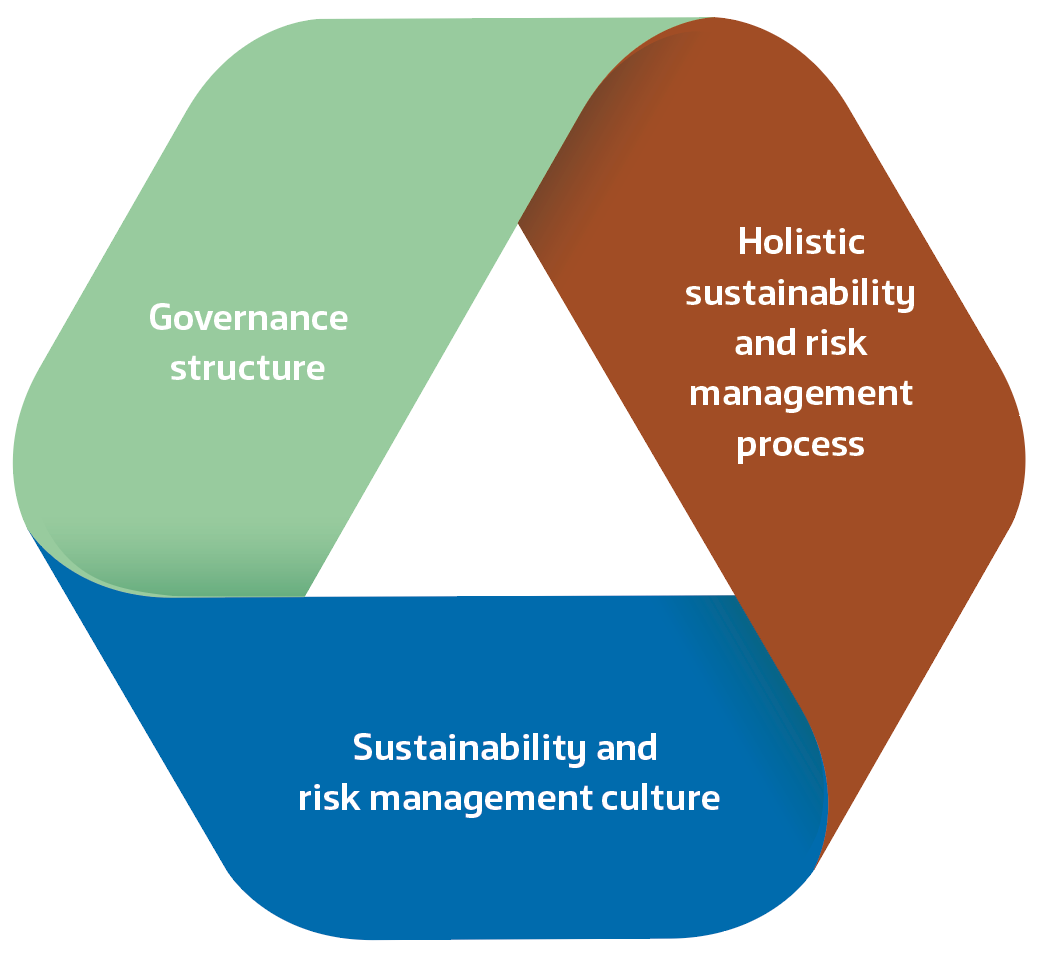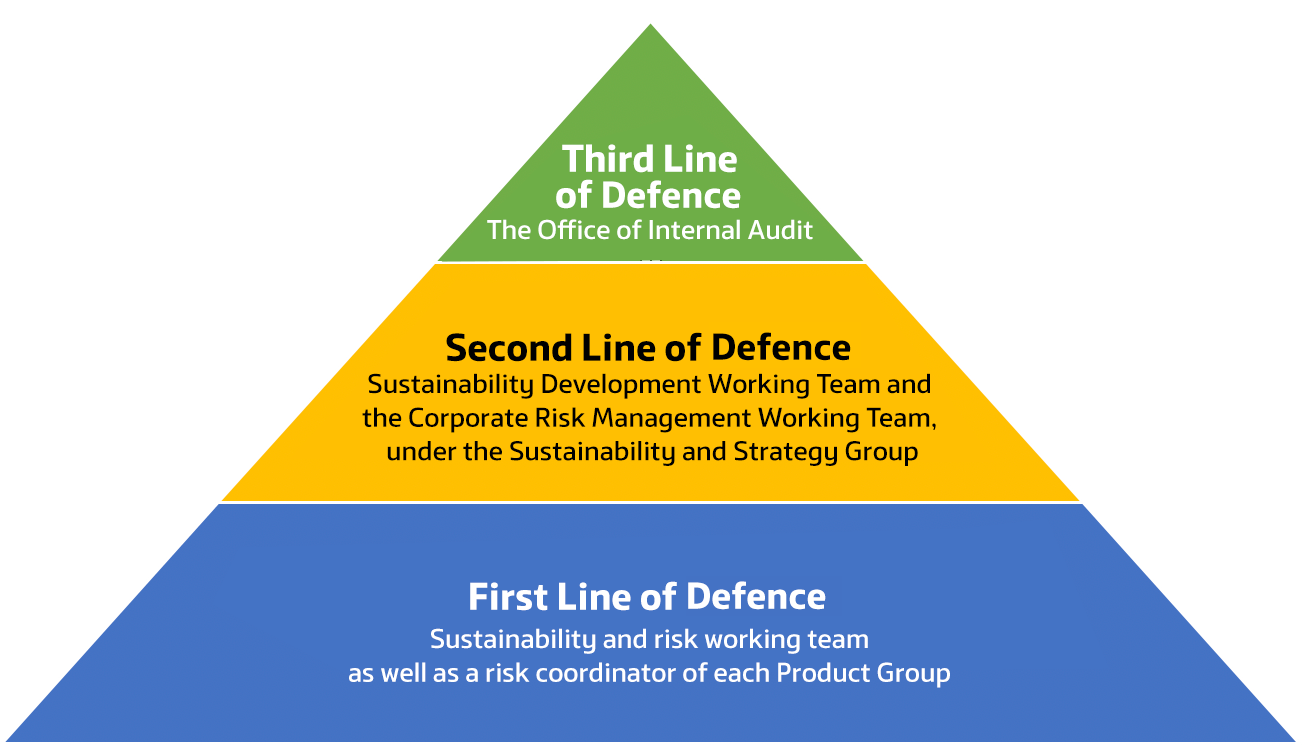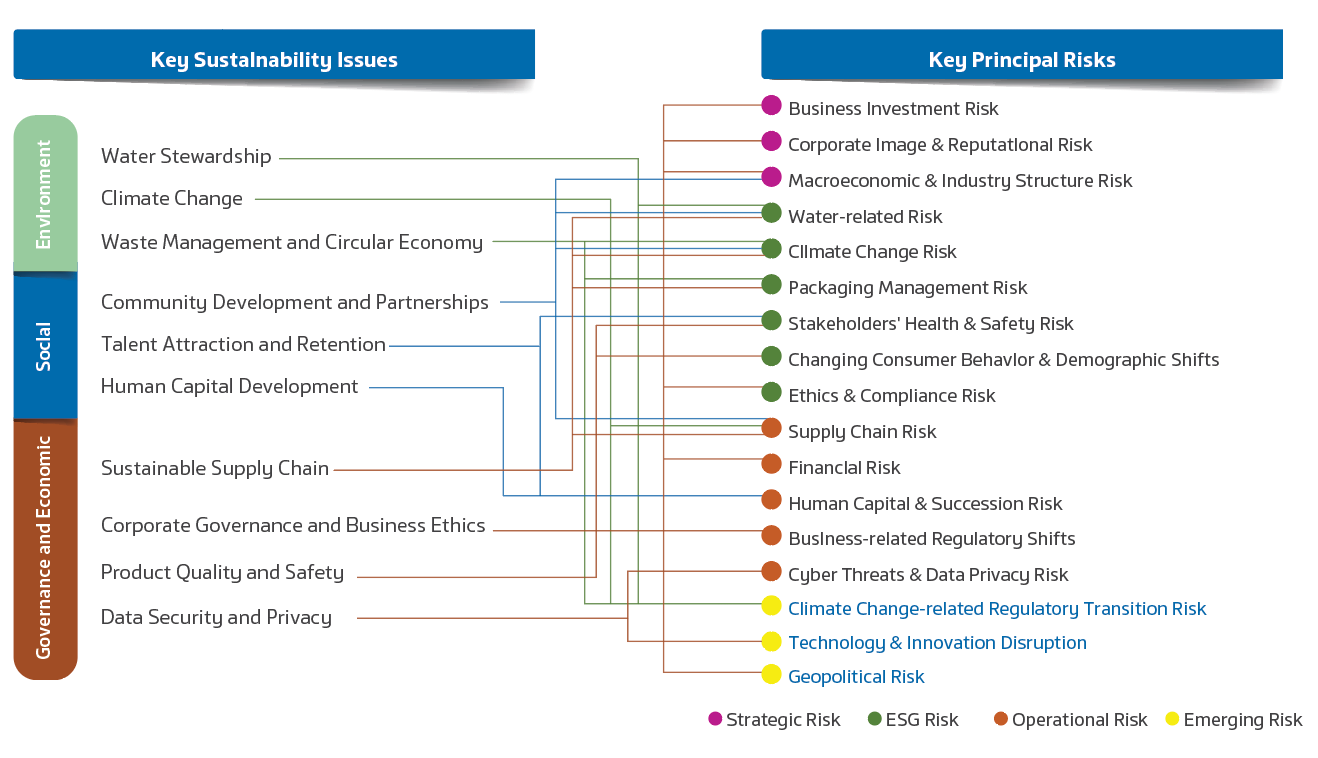ThaiBev Group’s risk management framework requires that risks significant to business operations and organization are identified, assessed, mitigated and promptly reported to the Board of Directors through the Sustainability and Risk Management Committee (SRMC). The policy framework ensures that all significant risks in each product group/business unit across the group are monitored and managed in a consistent way, with clear delegation of responsibility to relevant personnel to manage the risks under their control, in order to establish a sound risk management system as an integral element of ThaiBev Group’s routine management activity.
To comply with the applicable Code of Corporate Governance, ThaiBev conducts business with acceptable risk levels (risk appetite) in order to achieve our objectives and fulfill the expectations of our stakeholders. We have designated risk management as part of annual business planning, decision-making, project management and day-to-day routine processes.
- All our management and employees are risk owners who are responsible for identifying and assessing the risks in their business areas, and formulating appropriate mitigation measures.
- All risks to the achievement of the company’s objectives must be:
- Identified in a timely manner;
- Assessed on likelihood of occurrence and potential
impact;
- Managed in a manner that is consistent with the
company’s risk criteria with regard to costs and benefits;
Monitored to ensure that they are properly managed. This is necessary to reduce the likelihood and potential impacts or damage. The risks must be maintained at an acceptable level (risk appetite) and opportunities must be seized to develop business, environmental, and social sustainability.
- All risks to the company’s business plans and strategies which have a “high” or “extremely high” risk level must be reported to the Executive Committee, the SRMC, the Audit Committee, and the Board of Directors for appropriate risk oversight according to our governance structure.
The policy details can be accessed at Risk Management Policy
ThaiBev reviews, at least annually, the risks affecting our
sustainability in the environmental, social, and economic dimensions through analyses of internal and external factors, significant trends and the expectations of all stakeholders.
According to our risk review and assessment, ThaiBev separates principal risks into three categories: Strategic, ESG (Environmental, Social, and Governance), and Operational. Their potential impacts, key mitigations, and linkages to material sustainability issues are identified and dealt with through the company-wide management system. Furthermore, ThaiBev pays attention to emerging risks caused by external factors which are expected to have a significant long-term impact on our business and require us to adapt our strategy and/or business model in response.
ThaiBev develops and implements our sustainability and
risk management framework in line with the COSO
Enterprise Risk Management Framework, comprising
three key components:

Governance structure is the foundation of ThaiBev’s sustainability development and risk management. The Board of Directors has ultimate responsibility for risk oversight to ensure sustainable and successful business operations of ThaiBev Group. The SRMC, a board-level committee
consisting of independent directors, senior executives and distinguished external experts, is responsible for overseeing management of key corporate risks and sustainability-
related matters and opportunities, including review of risk appetite and tolerance before making recommendations to the Board of Directors for approval. The SRMC serves as the primary focus for risk assessment and management across all key functions, product groups, business units, and subsidiaries to ensure that all issues related to sustainability and corporate risks are covered.
The SRMC also works closely with the Audit Committee which is responsible for reviewing and monitoring the integrity of the group’s reporting process, audit process, and internal control system while ensuring compliance with legal and regulatory matters.
At corporate level, there are also a range of committees responsible for overseeing specific risks within their scopes and responsibilities.
The senior executive of each product group is responsible for implementing ThaiBev’s sustainability and risk management direction within his/her scope of responsibility. Each product group is responsible for setting up initiatives, policies and goals that are aligned with ThaiBev’s sustainability targets, while managing risks to an acceptable level (risk appetite), and reporting results of sustainability and risk management to the SRMC. Each product group has established its own sustainability and risk working team as well as a risk coordinator, who help control and track the performance, and work closely with the Sustainability Development Working Team and the Corporate
Risk Management Working Team, under the Sustainability and Strategy Group. Chief Sustainability and Strategy, serving as an SRMC member and Secretary to the SRMC,
is responsible for orchestrating ThaiBev Group’s strategy
and transformation in alignment with sustainability plans.

ThaiBev strictly complies with the principles of supervision and risk management outlined in The Three Lines Model (2020) of Institute Auditors: IIA, cascaded into the 'Three Lines of Defence’ process to oversee risk management, separating structures, roles, duties, responsibilities, and decision-making authority, ensuring process transparency through ThaiBev’s Board of Directors, Sustainability and Risk Management Committee (SRMC), Audit Committee (AC) and Sustainability Development Working Team and the Corporate Risk Management Working Team, under the Sustainability and Strategy Group.
The senior executive of each product group is responsible for implementing ThaiBev’s sustainability and risk management direction within his/her scope of responsibility. Each product group has established its own sustainability and risk working team as well as a risk coordinator, first line of defence, who help control and track the performance, and work closely with the Sustainability Development Working Team and the Corporate Risk Management Working Team, under the Sustainability and Strategy Group.
Sustainability Development Working Team and the Corporate Risk Management Working Team, second line of defence, reports to Sustainability and Risk Management Committee (SRMC) concerning overall risk management in the organization. This includes risk analysis of impacts to the company if such risks were to occur, in order to ensure the effectiveness of ThaiBev’s risk management plan. Sustainability and Risk Management Committee’s meeting is held quarterly (4 times per annum). The Chairman of SRMC reports to the Board of Directors on the company's overall risk management performance on a quarterly basis. Meanwhile, Sustainability and Strategy Group also reports to the President and CEO to ensure that the risk management execution plan is aligned with business strategy, on schedule, as well as effective in managing risk within risk appetite.
The Office of Internal Audit, third line of defence, directly reports to Audit Committee (AC) to consult and assess whether operational and compliance control policies and strategies in status quo cover existing and emerging risks to the company. The reporting line enables independent assessment without potential conflict of interests coming from other departments. Audit Committee’s meeting is held at least quarterly (4 times per annum) with the addition meetings between internal auditors to expression of independent opinions without Management’s influence. The chairman of AC reports to the Board of Directors on the company's overall control and relevant issues on a quarterly basis. Meanwhile, the Office of Internal Audit also reports the implementation of projects or activities contributing to risk management, monitoring and auditing to President and CEO, to ensure effective internal control cover financial, operational and compliance control.
ThaiBev proactively manages sustainability initiatives and risks-both strategic and operational-across the
organization, product groups, and business units. Our sustainability and risk management process incorporates global trends, risk factors, particularly ESG-related risk factors, and peers’ actions into consideration. During the business and investment planning process, senior executives are required to establish strategies to respond to both risks and opportunities, and identify key risk indicators and key performance indicators to assess and monitor situations.
The company’s sustainability and risk management process comprises the following four steps:
- Understanding business context and setting aligned
objectives for ThaiBev Group, product groups, and
business units
- Identifying principal and emerging risks and opportunities
for achieving specified objectives, using risk identification
and assessment techniques such as scenarios and stress-testing exercises to assess their potential impacts on ThaiBev and our stakeholders
- Setting and implementing action plans, together with controls, according to the determined countermeasures, while exploiting opportunities in line with our strategies and sustainability objectives
- Monitoring, reporting, and evaluating the results of
sustainability and risk management actions at least on
a quarterly basis
To ensure adequacy and effectiveness of the risk management process, the Office of Internal Audit, our internal independent
unit under the supervision of the Audit Committee, is responsible for auditing risk management, internal control, and governance processes.
ThaiBev’s sustainability and risk management culture aims to instill in all employees the right attitude, knowledge, and behavior in regard to sustainability development and risk management, with mutual objectives to achieve our sustainability and business goals. A strong sustainability
and risk culture is an important factor for the effectiveness of the organization’s sustainability development and risk management. It helps us be responsive and prepared to face potential situations, while maintaining business performance and creating continuous growth. ThaiBev integrates sustainable development and risk management, in both generic and specific areas, into new employee orientation, annual training, and employee activities.
Furthermore, ThaiBev uses sustainability and risk management as
a criterion for employee performance evaluation and organizes annual WOW (Way of Work) Awards to allow our employees to create solutions and new operational practices that can potentially improve sustainable development or mitigate risks for ThaiBev. Our senior executives act as judges, who select the best projects to be implemented across the organization.
As for risk reporting, employees can report potential risks
or any concerns to their supervisor in the first instance,
or through the recommended channels such as
whistleblowing@thaibev.com
In addition, ThaiBev has integrated sustainability and/or
risk management metrics that are aligned with the group’s targets into all executives’ annual performance assessment in areas such as:
- Environment
Energy Management, Carbon Emission Reduction, Water Stewardship
- Social
Employee Safety, Health and Well-being, Human Capital Development
Sustainability and risk management metrics are weighted
at 10–15% of our executives’ and employees’ annual
performance assessment.
To extend the scope of sustainability and risk management culture to our Board members, during FY2023, ThaiBev arranged a sustainability training program conducted by University of Cambridge Institute for Sustainability
Leadership and Earth on Board. Offered to directors and senior management, the training covered key topics on understanding the global sustainability context for business, Board duties, sustainability at the centre of strategy, sustainability reporting to drive progress, as well as
Board leadership and actions.
ThaiBev promotes an effective risk culture by integrating risk processes, procedures, and employee awareness throughout the organization as following:
- To ensure a comprehensive and effective risk culture, ThaiBev implement regular risk management education for non-executive directors and provide cybersecurity protection and data privacy training for all employees. Additionally, conducting an annual risk assessment with external assurance and verification will further strengthen their risk management framework. click here to read more
- To ensure the safety and health of consumers, ThaiBev consider various risk factors when developing new products or services, especially in the food and beverage sector. Given the direct impact on consumer health, it's essential to implement rigorous quality control and leverage the growing interest in health and wellness, particularly in the context of an aging society. click here to read more
- To effectively integrate risk management into the company's performance framework, ThaiBev offer financial incentives tied to meeting risk-related goals. This approach ensures that the CEO, executives, and employees are aligned with the company's risk management objectives, particularly in areas such as climate strategy, GHG emissions reduction, and water stewardship. click here to read more
ThaiBev has integrated material sustainability issues into our holistic risk management process by identifying risks under three categories: Strategic, ESG (Environmental, Social,
and Governance) and Operational. Potential downside and opportunities in relation to the company’s strategic
objectives are identified and prioritized. In addition, we focus on emerging risks which may impact us on a mid- or even long-term basis. The identified risks and emerging risks
are managed as part of Enterprise Risk Management.
The outcome of this process indicates significant risks and emerging risks that require the company to pay close attention and adopt effective mitigations, including adapting our strategy and/or business model. For risks with an unchanged or lower risk level, ThaiBev will continue to monitor and analyze changes in risk level periodically.

In the context of environmental protection pressures, societal changes, and geopolitical tensions that are growing in severity and frequency, ThaiBev realizes that traditional risk management, which focuses on planning and reducing vulnerabilities to well-defined risks, must be expanded to include resilience management, by planning for the
unexpected, building up response capabilities in advance, and facilitating adaptation, as well as speedy recovery
from adverse events or disruptions. ThaiBev focuses on strengthening the following core resilience areas to drive excellent business performance through crisis and climate change issues.
-
Balancing short- and longer-term financial spending
and managing sources of funds appropriate to investment and commercial activities, with a solid capital position and sufficient liquidity, enables ThaiBev to cope with potential scenarios of rapid drops in revenue, increased cost, and financial market volatility.
-
Robust and flexible production capacity enables ThaiBev
to pivot to meet changes in demand and remain stable in
the face of operational disruption, without compromising quality. We also pay attention to our supply chain and delivery mechanisms, particularly through engagement and collaboration with business partners, in order to maintain operational and product distribution capacity to our customers and consumers, even under scenarios ranging from failures of individual suppliers/distributors to natural disasters and geopolitical events.
-
Investment in strong, secure, and flexible technological infrastructure enables ThaiBev to manage cyberthreats and avoid technology breakdowns. IT projects on a variety of scales have been continuously implemented to keep pace with customer needs, competitive demands, and regulatory requirements. At the same time, we uplift our employees’ digital technology skills, and maintain business continuity and disaster recovery capability to avoid service disruptions for customers and internal operations.
-
Stakeholders keep organizations accountable for their actions, brand promise, and commitment on ESG issues. ThaiBev has established a strong mission, values, and strategies that guide our actions in terms of business conduct and ESG practices. We are open in listening to
and communicating with stakeholders, anticipating and addressing societal expectations.
-
ThaiBev has developed a business model that can adapt to dynamic and uncertain environments, including significant shifts in consumer demand, the competitive landscape, emerging technologies, and regulatory terrain. Our
Transformation Program and PASSION 2025 aspiration serve to ensure our business model resilience into the future through:
- Building new capabilities and innovating to enhance our business and service model, product offerings, and sales channels, as well as partnering with stakeholders on
sustainability initiatives.
- Strengthening our leadership positions and
competitiveness in core markets (i.e. Thailand, Vietnam, Myanmar, Singapore, and Malaysia), by creating
a sustainable supply chain, digitalizing processes,
and focusing on brand portfolio management.
- Unlocking potential to enhance shareholder value by strengthening partnerships, increasing asset value,
and developing a highly skilled and talented workforce.
-
ThaiBev has continually improved our identification,
assessment, and management of climate risks and
opportunities specific to the organization over the short, medium, and long terms. This effort results in broadened
and deepened scenario analysis through the integration
of climate-related issues into our climate governance and business strategy. Moreover, ThaiBev has conducted capacity-building sessions on climate risks and
opportunities, as well as setting associated metrics and targets to ensure accountability for sustainability and climate-related actions.
Having assessed climate-related physical and transition risks and opportunities, we have embarked upon climate-related initiatives with both mitigation and adaptation measures. These include investment in resource efficiency and material circularity, development of low-carbon products, supplier engagement, and reforestation. Our aim is to reduce the impact of climate change across our operations and value chain, while capturing the opportunities arising from the transition to a low-carbon economy.
In 2023, in order to further integrate climate-related issues into decision making, ThaiBev conducted exercises across product groups, at asset level, to quantify the financial impact of prioritized climate risk drivers. In this regard,
we also started using Internal Carbon Pricing (ICP) to assess the potential impacts of carbon emissions during the decision-making process to invest in low-carbon technology. The Investment Committee employs ICP as shadow pricing to support CAPEX investment decisions in green projects and prevent CAPEX investment decisions in high-emission projects.
ThaiBev realizes that foresight capabilities are a vital
foundation for building the above types of resilience successfully. Therefore, ThaiBev has engaged with
stakeholders to obtain feedback, input and expertise to enhance our foresight and ability to anticipate change.
We continuously gather and study relevant data to develop scenarios and perform stress tests to discover gaps in resilience, and use them to anticipate and prepare for future crises in advance. Appropriate crisis response capabilities
are developed and practiced to ensure timely and effective actions in case of disruptions.










